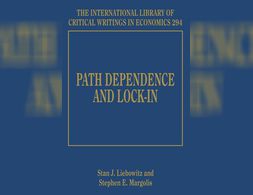✕
190 results
The book is a collection of 51 texts by different scholars and activists, who each adds a dimension/perspective to the topics of degrowth and societal transformation. A societal transformation towards a degrowth society is dependent on a lot of ideas coming together and creating change from various starting points within a society. Therefore, the authors are quite diverse and their contributions vary from being philosophical, natural science based, economic, sociological and so forth. Some are specfiically focused on a concept and others are a more broad critique of e.g., capitalism or growth.
In this book, Kalyan Sanyal reviews the traditional notion of capitalism and propounds an original theory of capitalist development in the post-colonial context. In order to substantiate his theory, concepts such as primitive accumulation, governmentality and post-colonial capitalist formation are discussed in detail.
This is an important contribution that defends the importance of heterodox economics. It discusses what constitutes heterodox economics as an intellectual, social, and political project, with a range of contributions from leading heterodox thinkers coming from a diversity of theoretical vantage points.
Identity politics is everywhere, polarising discourse from the campaign trail to the classroom and amplifying antagonisms in the media. But the compulsively referenced phrase bears little resemblance to the concept as first introduced by the radical Black feminist Combahee River Collective.
The investigative research conducted by the German weekly newspaper "Die Zeit" and the British Daily Newspaper "The Guardian" includes a research-based critique of carbon trading.
In order to address discrimination, we must understand and address its fundamental basis of systemic oppression. Stratification economics goes beyond myopic mainstream conceptualisations of discrimination and recognises the historical, institutional, and structural factors that create and maintain socioeconomic disparities and hierarchies. To critically approach the economics of discrimination, this workshop will focus on stratification economics, a systematic and empirically grounded approach to addressing intergroup inequality (Darity, 2005). Focusing on racial discrimination, we will discuss the core elements of stratification economics, critically evaluate its relevance, and apply these understandings to construct case studies and solutions for change. In our discussions, we will consider an array of topics, including intersecting oppressions, reparative justice, and the role of knowledge production in overcoming injustice and creating a better world.
Feminist economics critically analyzes both economic theory and economic life through the lens of gender, and advocates various forms of feminist economic transformation. In this course, we will explore this exciting and self-consciously political and transformative field.
In this lecture Ben Fine aims at stimulating interest for and explaining the relevance of Marxist Political Economy. Ben Fine dedicates the first half of his comprehensible lecture to the question on how mainstream economics became the way it is by explaining its key concepts and how those evolved during the past 150 years. While critically reflecting those concept he also emphasizes that mainstream economics does not consider historical processes. This is the point of departure on his presentation of the core terms and crucial categories of Marxist Political Economy: e.g. the production process and class relations (Part 1). Part 2 examines the consequences of the capitalist mode of production and its propensity to crises. Ben Fine illustrates this Marxist analysis with the example of the current crisis and explains current conditions for the accumulation of capital.
In this lecture Ben Fine aims at stimulating interest for and explaining the relevance of Marxist Political Economy. Ben Fine dedicates the first half of his comprehensible lecture to the question on how mainstream economics became the way it is by explaining its key concepts and how those evolved during the past 150 years. While critically reflecting those concept he also emphasizes that mainstream economics does not consider historical processes. This is the point of departure on his presentation of the core terms and crucial categories of Marxist Political Economy: e.g. the production process and class relations (Part 1). Part 2 examines the consequences of the capitalist mode of production and its propensity to crises. Ben Fine illustrates this Marxist analysis with the example of the current crisis and explains current conditions for the accumulation of capital.
In this podcast, Professor Darrick Hamilton critically discusses how current neoliberal economic models uphold a systemically racially unjust structure of economies.
This brief note explores the possibility of working towards an enlarged self-definition of economics through economists’ study and appreciation of economic sociology. Common ground between economic sociology and heterodox economics is explored, and some of Richard Sennett’s ideas are used as prompts to raise some pertinent and hopefully interesting questions about economics. In particular, the note revisits the question of whether there is a possibility of changing our understanding of what kind of social scientific work falls within the domain of economics proper once we start critically engaging with work conventionally considered to be outside of that domain. In part, the note is intended to offer undergraduate students in economics – and possibly even those further down the road in their education – food for thought about what constitutes economics.
Since their first emergence in the work of Paul David thirty years ago, the dual issues of Path Dependence and Lock-In have become critically important subjects in the fields of economics, sociology, and business strategy.
In this book, the author critically examines a number of socialist proposals that have been put forward since the end of the Cold War. It is shown that although these proposals have many merits, their inability effectively to incorporate the benefits of information technology into their models has limited their ability to solve the problem of socialist construction. The final section of the book proposes an entirely new model of socialist development, based on a "needs profile" that makes it possible to convert the needs of large numbers of people into data that can be used as a guide for resource allocation. This analysis makes it possible to rethink and carefully specify the conditions necessary for the abolition of capital and consequently the requirements for socialist revolution and, ultimately, communist society.
Health Economics traditionally involves two distinct strands. One focuses on the application of core neoclassical economic theories of the firm, the consumer and the market to health-seeking behaviour and other health issues. It suggests a role for government intervention only in the case of specific market failures (for example externalities, asymmetric information, moral hazard, and public goods) that distort market outcomes. The second strand is evaluation techniques, used to assess the cost effectiveness of competing health interventions.
This book discloses the economic foundations of European fiscal and monetary policies by introducing readers to an array of alternative approaches in economics. It presents various heterodox theories put forward by classical economists, Marx, Sraffa and Keynes, as a coherent challenge to neoclassical theory.
Teaching and learning ontology and epistemology. Onto-what? Bates & Jenkins explain what is needed to equip students with the ability to critically reflect on learned content and understand meta-discussions in their field.
Jason Smith takes a stab at blind faith in the efficiency of the price mechanism to provide market information. To do so, he calls upon Information Theory and Generative Adversarial Networks to argue the price mechanism is faulty and skewed towards supply.
This film looks at the role economic growth has had in bringing about this crisis, and explores alternatives to it, offering a vision of hope for the future and a better life for all within planetary boundaries.
Course goals Learn about women men and work in the labor market and the household Learn to apply the tools of economic analysis to these topics and deepen understanding of these tools Develop the skills to think critically about gender issues including policy interventions Enhance understanding of how to analyze …
The present working paper is dedicated to fill a void in the degrowth literature related to the aspect of planning to achieve post-growth models of societies. The authors propose a new framework that focuses on non-market forms of planning and propose multi-level planning institutions to mediate the local level with society-wide and global institutions.
Information and skills required to make more sustainable choices every day.
Neoliberalism is dead. Again. After the election of Trump and the victory of Brexit in 2016, many diagnosed the demise of the ideology of Margaret Thatcher, Ronald Reagan, Augusto Pinochet, and the WTO. Yet the philosophy of the free market and the strong state has an uncanny capacity to survive and even thrive in crisis.
This syllabus provides an overview of the content of the Philosophy and Economics course at the University of Waterloo.
The second edition of International Political Economy continues to be the perfect short introduction to the fundamental theories and issues of international political economy (IPE).
Focusing on Kenya’s path-breaking mobile money project M-Pesa, this book examines and critiques the narratives and institutions of digital financial inclusion as a development strategy for gender equality, arguing for a politics of redistribution to guide future digital financial inclusion projects.
This book gives a very clear overview of the history of Macroeconomics and how it has evolved. It reflects on the different perspectives and debates that have defined the field, with valuable insight into the history and theory of economic policy.
This edited volume presents a collection of articles that engage with various concepts from Marx’s Capital and Marxian theory in general, from a ‘Southern’ perspective. The book engages with four specific themes: “Reception of Capital in the East; Value, Commodity, Surplus Value and Capitalism; Population and Rent in Capital; and Issues Beyond Capital”.
In this new book Smith returns to Solow s classic productivity paradox which essentially states that we can see automation everywhere like the spheres of leisure sociality and politics but not in the productivity statistics He examines why labor saving automation in the service age in the Global North has …
The book critically engages with various Marxian perspectives on the dynamics on development and social progress It specifically engages with some key words in Marxian theory including Marx s early work on capitalist development and his later works on underdeveloped Russia Lenin s thesis on imperialism as a hurdle for …
The idea of a Green New Deal was launched into popular consciousness by US Congressperson Alexandria Ocasio-Cortez in 2018. Evocative of the far-reaching ambitions of its namesake, it has become a watchword in the current era of global climate crisis. But its new ubiquity brings ambiguity: what - and for whom - is the Green New Deal?
We use cookies on our website. Click on Accept to help us to make Exploring Economics constantly better!


























